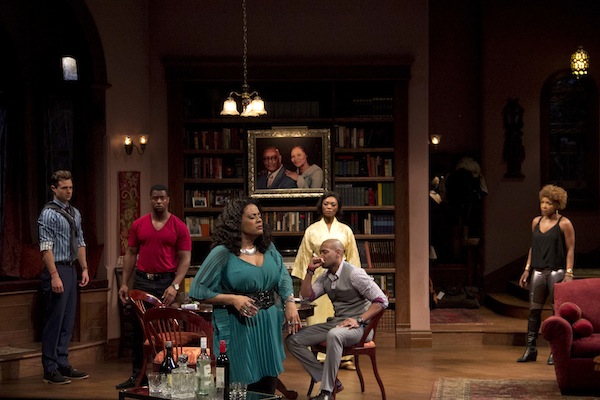
Phylicia Rashad speaks on stage at the BET Awards at the Nokia Theatre on Sunday, June 29, 2014, in Los Angeles. (Photo by Chris Pizzello/Invision/AP)
Phylicia Rashad has created a legacy of excellence in film and television, recently she set off to do the same in the director’s seat and commanded veteran actors and newcomers alike towards the same level of excellence theatre.
Speaking with Rashad is akin to stepping into your favorite classic episode of the Cosby show. Her humble demeanor hiding behind lips that smile and release the same wisdom Claire Huxtable was known for. Hardworking, not afraid to speak intelligently and articulately, Rashad explains how she got into theatre directing for the theatre.

Actress Phylicia Rashad attends the the world premiere of ‘Eat Pray Love’ at the Ziegfeld Theatre on Tuesday, Aug. 10, 2010 in New York. (AP Photo/Evan Agostini)
“[My directing] didn’t start by me saying that, ‘I wanted to direct,’” explained Rashad. “My venture into directing began with an invitation from Constanza Romero, whose husband was August Wilson. She invited me to direct a production of August Wilson’s ‘Gem of the Oceans’ at the Seattle Repertory Theatre. I said, ‘Yes,’ and that’s how it began. That was the first production that I directed.”
August Wilson’s ‘Gem of the Ocean’ garnered Rashad her first Tony Award nomination as a director and national acclaim.
“A couple of years later,” Rashad continued, “Ren Brown, the artistic director of Ebony Repertory Theatre here in Los Angeles, invited me to direct a production of ‘A Raisin in the Sun’ and I did. After that, Center Theatre Group extended an invitation to me to come and direct at the Mark Taper Forum, ‘Joe Turner’s Come and Gone.’”
As for this play, Rashad made a conscious effort to pay special attention to the meaning behind the words. “I read the play, with the sincere effort to discern what is the playwright is saying,” adds Rashad. “That’s how it starts. Then there is the creative team. You assemble the lighting, the set, costume design, and choose the stage management to work in conjunction with [the director].”
“I never come into a rehearsal with a set idea of how things are going to look and how they are going to go. I have been working with the set designer before I get to the first day of rehearsal. We have designed the set together. By that, I mean, we collaborate. I look at things and elements, make certain suggestions, always letting the designer do the work, because the designer knows. When we come into the room [the set design] is the one thing that is fixed.”
After that, Rashad notes that she works with the actors, feeling out the script, doing several reads and prepping them for the performance.
“We begin to talk about the script. We begin to talk about the script in terms of the overarching themes; we talk about the script in terms of each character’s journey in the story,” she said.
It’s this kind of work, Rashad says, that gives her a sense of when the actors are ready to rehearse.

“Then there comes a stage after we have been in the rehearsal hall for a while, after our first, what we call our ‘Stumble Through,’ where we do the whole thing. Then we begin to refine scenes and look through and do ‘run throughs every day, so we get accustomed to the flow of the show, and the actors can begin to feel the threads that need to be connected in their individual character’s journeys and stories and how to relate to one another.”
Rashad, as the director of the play, emphasizes that I’s her job to bring playwright Paul Oakley Stovall’s vision to fruition on set.
“[Paul Oakley Stovall] is a renaissance man,” continued Rashad, “He’s poetry, he’s music, he is literature, he is agriculture, he is science, he is public policy, and he is politics. He is a renaissance man.”
Rashad, who’s off stage personality doesn’t fall far from the one she made popular during her run as the mother on the Cosby Show, shows her maternal values, embracing Stovall as a mother would a son.
“We were doing a stage reading of ‘Charleston Oleo’ in Jackson Mississippi, and he was part of that cast. So we worked a couple of days together. When we were saying good-bye, he said, “I have a couple of plays that I have written and I’d like to send them to you,’ and he did. ‘Immediate Family’ was one of them and it was about three weeks after he sent the play to me, he called me and he said, ‘Oh, by the way, did I ask you to direct this play?’”

Human rights are a theme throughout our nation’s past, and remains even today as a topic that cannot be ignored. The play ‘Immediate Family’ deals with the rights of people to have the type of life that they want, despite the opinions and feelings of others around them. Homosexuality is a theme throughout ‘Immediate Family,’ but according to Rashad, is not the focus.
“This play is about adult siblings,” corrected Rashad, “this play is about acceptance. This play is about self-acceptance, and this play is about accepting people that we love and seeing them as they see themselves. This play is about family. When you talk about family, you’re going to talk about race, religion, you’re going to talk about politics, and you’re going to talk about sexuality. These things come into play with family.”
Mrs. Phylicia Rashad has proven herself as a no nonsense lady, and has been successful at captivating audiences and a stage actress, television actress and has now stepped into the field of directing stage plays. The future is bright for Mrs. Rashad.
For more information on Phylicia Rashad’s play ‘Immediate Family,’ go to www.centertheatregroup.org/.






